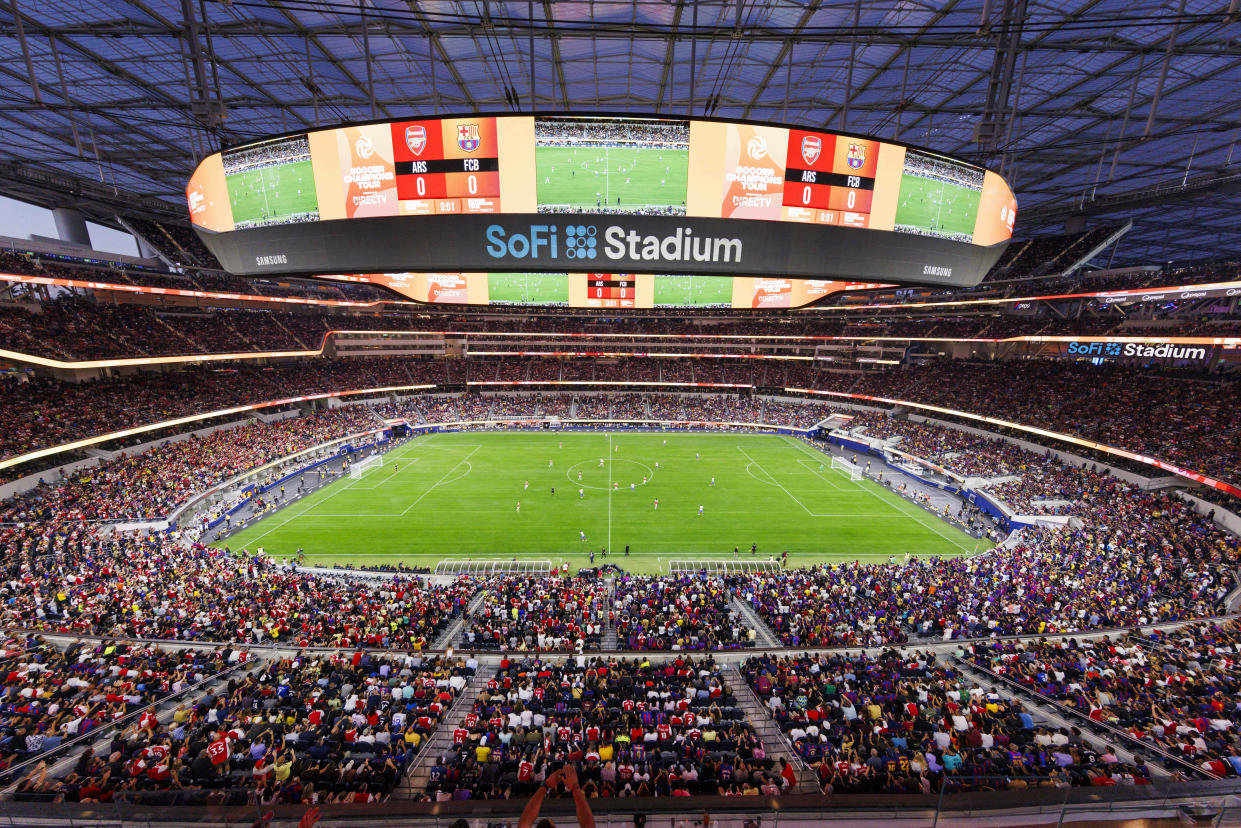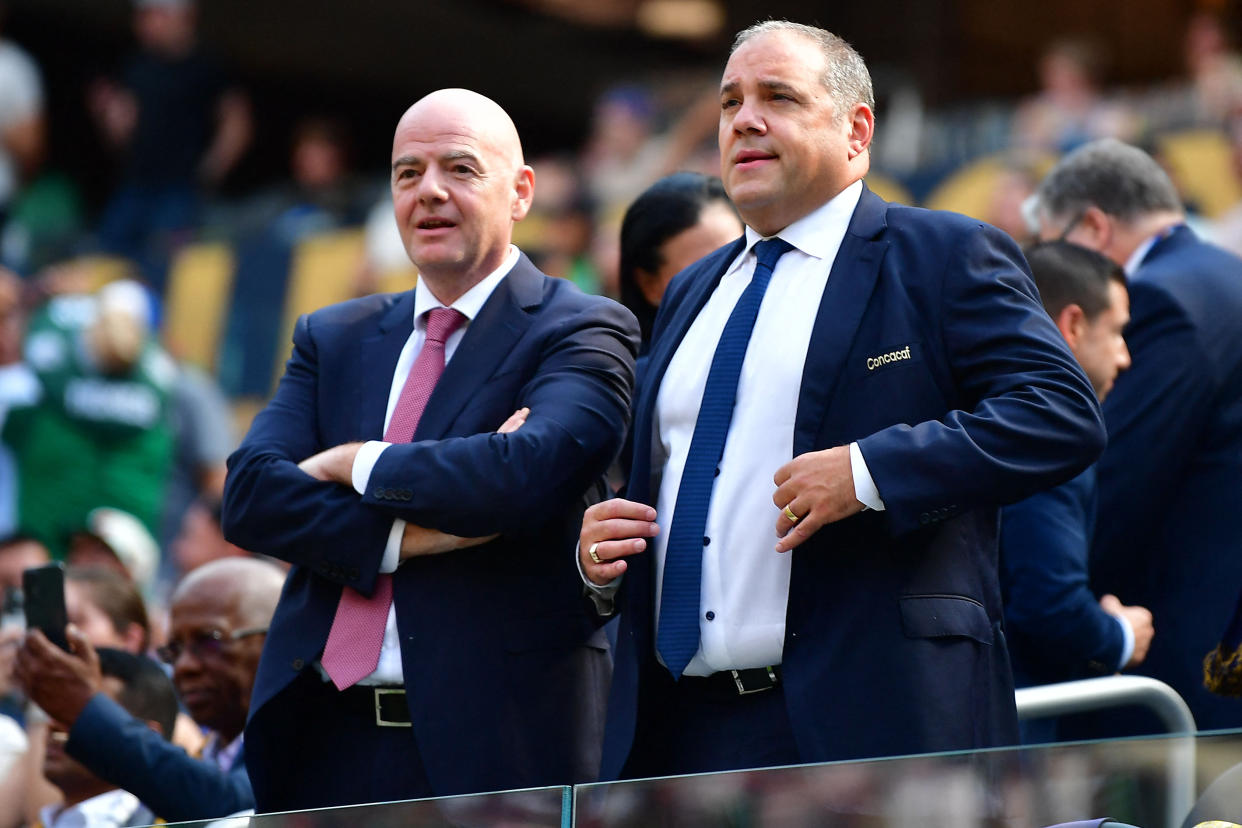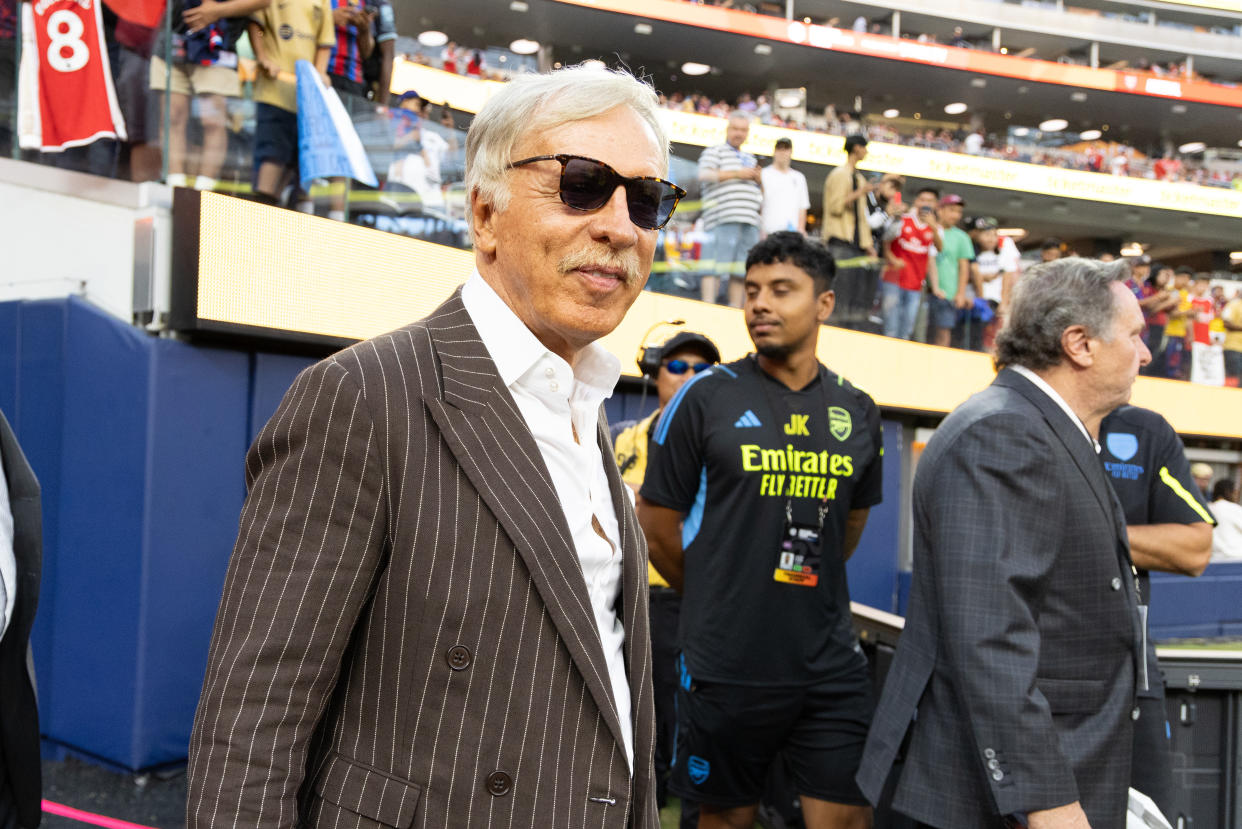LA-FIFA standoff at center of 2026 World Cup’s first battle: Who’s paying for it?

A standoff between FIFA and officials in Los Angeles, including Los Angeles Rams owner Stan Kroenke, could jeopardize LA's involvement in the 2026 World Cup, which will be played across North America.
Los Angeles and SoFi Stadium were confirmed last year as one of 11 U.S. host sites. But multiple people familiar with the matter confirmed to Yahoo Sports that the local host committee and Kroenke, who owns the stadium, have been locked in a battle with FIFA over money.
Those people, and others in 2026 host cities, said that several cities share LA's frustration with commercial arrangements that will allow FIFA to make billions of dollars off the tournament while local host committees struggle to cover costs. But, “in those other [cities], it's not live or die,” one source said. “Whereas in LA, it is almost coming down to that.”
The exact nature of Kroenke’s threats to spurn the World Cup are unclear. The Athletic reported in September that his holding company, Kroenke Sports and Entertainment, had threatened to walk away from hosting matches unless commercial deals were renegotiated. The Los Angeles Times reported Tuesday that the possibility also hinges on whether SoFi is selected to host the 2026 final (unlikely), or at least an opener or semifinal. In mid-October, ESPN’s John Sutcliffe reported that Kroenke had already notified FIFA that SoFi would be pulling out, via an exit clause, but multiple sources told Yahoo Sports that report was premature.
It’s also unclear whether Kroenke’s threat is legitimate or, perhaps, merely a leverage ploy in negotiations over the details of a local sponsorship program that will serve as a key source of revenue. Each of the 11 U.S. host committees is expecting to spend somewhere in the region of $100 million — give or take tens of millions, mostly depending on market size — to fulfill its World Cup obligations, according to multiple people familiar with budgets. All will rely on private fundraising to cover many of those millions. But in cities where public funding is scarce, such as Los Angeles, officials are concerned that FIFA-imposed restrictions on their offerings to sponsors or donors will prevent them from balancing budgets. So, some have been pushing back.
The tension extends beyond LA, and is semi-customary in the buildup to major sporting events, including previous World Cups and Super Bowls. But it’s been fiercer, longer-lasting and more uncertain than usual in advance of 2026, sources said. It “goes far deeper than it's being reported,” one source said in mid-October. “It's at the highest point it's been.” And it’s fiercest in LA, where SoFi Stadium’s architecture — and specifically, its narrowness — makes World Cup alterations more costly than elsewhere.
As it simmers, LA officials have remained engaged in World Cup planning, sources said. It seems “unimaginable,” as one said, that the city wouldn’t be prominently involved in the tournament. FIFA would love to play at Kroenke’s $5.5 billion stadium. Kroenke and the city would love to host the biggest sporting event in the world. But the economics are contentious and complicated.

FIFA's tight grip on World Cup revenues hits U.S. host committees
The tension hearkens back to an observation made by Jérôme Valcke, FIFA’s then-general secretary, in 2013: “Less democracy is sometimes better for organizing a World Cup.”
In autocracies, such as Russia and Qatar, governments were quite happy to foot a World Cup’s bill, effectively paying billions for the soft power and other benefits associated with hosting.
But in the U.S., citizens and public officials have been wary. Chicago, among others, declined to even bid for World Cup games, citing taxpayer risk and “FIFA’s inflexibility and unwillingness to negotiate.” Most cities that did agree to host have turned to a traditional American model structured around sports commissions and a local “host committee,” non-profit entities tasked with raising money that will pay for parts of the World Cup — and, ideally, shield taxpayers from bearing costs.
Those host committees, though, have grappled with a critical question: How can they raise enough money if FIFA doesn’t give them much to sell?
FIFA owns the World Cup. It goes on tour every four years, asking hosts to pay for things like fan festivals and security. Under a new centralized approach for 2026, FIFA has taken on more expenses than ever before (roughly $4 billion is budgeted); it has also taken control of all major revenue streams, ensuring that most or all money from ticket sales and sponsorships flows back into its own bank accounts, then out to the global soccer ecosystem.
That new approach, plus the unprecedented scale of this World Cup — 48 teams, 104 games, many in colossal NFL stadiums — should yield over $10 billion in income. But it has left many American entities, from the U.S. Soccer Federation to local host committees, on the outside looking in at this gargantuan commercial pie.
The exception is a “host city supporters program” — similar to the ones that fund Super Bowl committees, but a novel undertaking for FIFA. Each World Cup host committee has been told that it can sign 10 companies to city-specific sponsorship deals. What they still don’t know — and what they’ve been haggling over for months, since at least last winter — is what, exactly, they can offer those companies in exchange for multimillion-dollar commitments. FIFA has promised some match tickets and hospitality packages for inclusion in the program. There will also be intellectual property, some sort of branding that identifies the company as a backer of the World Cup in a given city. But FIFA, U.S. sources argue, has been stingy with IP, and hesitant to design anything that infringes on its broader World Cup sponsorship contracts, such as those with McDonald’s and Coca-Cola, which collectively net FIFA billions of dollars.
There are also discussions around “fan fests” — which could be opportunities for local sponsors to activate, or for host committees to glean direct revenue. In general, multiple officials said over the past week, FIFA has shown some recent willingness to grant the host committees more flexibility. “There’s been some movement,” one person familiar with negotiations said. “But not enough at this point to make up the difference.”
To make up the difference, meanwhile, host committees have been exploring or shoring up public support. The two Texas cities, for example, Dallas and Houston, have access to the state’s Major Events Reimbursement Program. Others expect to tap into state or local governments — which, in return, can benefit from World Cup-related tourism and injections of economic activity.
At least 10 of the 11 U.S. cities have also hired lobbyists to seek “federal funding opportunities and awareness for 2026 World Cup hosting needs,” per disclosures to the U.S. House of Representatives. One Senate filing by LA’s host committee specifically mentioned “funding … for transportation and security.”
In the absence of federal help, though, the LA operation will be largely private. And Kroenke, its chief financier, is apparently questioning whether the World Cup is even worth his time and trouble.

Stan Kroenke, SoFi Stadium face World Cup dilemma
For Kroenke, the World Cup comes with costs but also opportunity cost. SoFi Stadium regularly hosts concerts and other events. Nine nights of Beyoncé and Taylor Swift this summer likely brought in millions of dollars. The World Cup would interrupt that cash flow. So would pre-tournament construction.
FIFA requires all stadiums, at their owner’s expense, to provide a manicured grass pitch that’s at least 68 meters (74.4 yards) wide, with a total field area at least 85 meters by 125 (93 yards by 136.7). SoFi’s current playing surface is far too narrow. Its oval stands creep very close to the corners of an American football field, which is only 53.3 yards wide (plus 4 yards of sideline). So, to accommodate the World Cup, SoFi will likely have to tear down lavish field-level suites and thousands of expensive seats in the spring of 2026. It would then have to rebuild them once the tournament concludes in July — or forge ahead in its altered state. All of this makes the World Cup less palatable.
But all this, of course, has also been a known requirement all along — in LA, and elsewhere. Kroenke and others have committed to renovating their stadiums, sources said. In fact, it’s unclear whether he and LA could even get out of their host city contracts (and avoid legal action) if they wanted to.
There’s also the potential embarrassment associated with ditching the World Cup in a fit over finances. The prestige of hosting World Cup games, on the other hand, is probably worth some degree of financial loss. Those are two of several reasons why most people who spoke with Yahoo Sports remain optimistic that LA won’t withdraw. “Nobody wants to get to that point,” one source said. Concessions on both revenue and expenses could be made. A representative for the LA host committee said in a written statement that it has been “working closely with FIFA on many aspects of the event,” and conversations have been “ongoing” and “collaborative.”
At the very least, though, this tension seems to have delayed major announcements, including the site of the final and opener, and the full match schedule. Cities still don’t know how many games, nor which ones, they’ll be hosting. That, in turn, has been another point of frustration for officials, whose budgets and operations depend on those crucial details. “This,” one said of the entire planning process, “is already waaaay behind schedule.”
